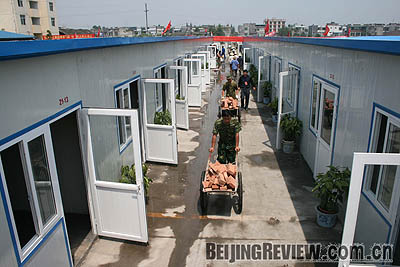|

GIVE ME SHELTER: Workers clean temporary houses for earthquake victims in Sichuan Province on June 3. Priority will be given to families that include pregnant women, infants, orphans and childless senior citizens
The government is striving to ensure people's rights are respected as whole communities relocate to safer areas following the earthquake
Besides killing nearly 70,000 and leaving hundreds of thousands injured, the May 12 earthquake in Sichuan Province also wreaked devastation upon the living environment.
At the epicenter of the earthquake, Wenchuan in Sichuan's northwest, home to a population of 80,000 people, was turned into a "dead county." While most buildings in the county remained standing, 3,590 sites were left prone to geological disaster, threatening 80 percent of buildings and roads. Heavy rain has since increased the risk of landslides.
Officials of the county government told the Beijing Times newspaper on June 15 that because of safety concerns more than 50,000 residents of Wenchuan would be relocated to settlements along an artery road by the end of June, extending along a 20-km corridor.
Many farmers are left to make a new life having seen their land destroyed by the quake.
There were 7,100 hectares of farmland in Wenchuan, a largely agricultural area, before the earthquake. The quake destroyed 2,800 hectares and severely damaged another 3,200.
Yin Zhi, Vice Dean of the School of Architecture of Tsinghua University and a member of an expert panel stationed in the earthquake zone by the Ministry of Housing and Urban-Rural Development, completed a report recently, concluding that Wenchuan is no longer suitable for people to live in. In the report, he strongly recommended that Wenchuan should be rebuilt in new safer areas.
While expert opinions are being solicited during the colossal reconstruction project, which could last a decade, overall guidelines were released on June 9, after Premier Wen Jiabao signed a State Council decree to make them effective a day earlier.
The new regulation set guidelines for reconstruction and provided an important legal basis for the reconstruction work, said a spokesman of the Legislative Affairs Office of the State Council, China's cabinet.
He said the regulation was to ensure sound life, production, study and working conditions in quake-affected regions.
Covering nine chapters and 80 stipulations, it included the transitional settlement of quake-hit people, reconstruction planning, assessment, financing, supervision and management and legal obligations.
It also put forward special requirements on earthquake-resistance levels of infrastructure construction in the quake-hit regions, including schools and hospitals.
According to the regulation, related departments should properly arrange the location of temporary housing and their supporting facilities as well as the distribution of funds and materials.
It also made clear that governments at all levels should regularly publicize the source, amount, distribution and use of relief capital and goods for public supervision.
Audit organs should strengthen checks on the use of reconstruction capital and goods and regularly make information about them available to the public.
While helping resume production, local governments should offer quake victims psychological counseling, the regulation added.
Priority to traffic
Reconstruction in earthquake zones will give priority to transport facilities, said Cao Kangtai, Director of the Legislative Affairs Office of the State Council, on June 12.
"The May 12 earthquake has done great damage to roads in the quake zones," said Cao, the official in charge of drafting the State Council's post-quake reconstruction regulation, at a press conference.
"The reason why we give transportation top priority in the post-quake reconstruction regulation is that roads are vital for the reconstruction of other public facilities. They serve as the major means of access for construction materials."
He added that the reconstruction of power supply facilities would be another focus of the work at hand, while housing, schools, hospitals and other public facilities would also be addressed.
Cao urged local authorities to monitor protection of ethnic cultural relics during the relief work and post-quake reconstruction.
"A lot of cultural relics, especially those of China's minority ethnic groups, were seriously damaged during the quake. For instance, quake-ravaged Beichuan County is China's only Qiang ethnic autonomous county. Beichuan Qiang Ethnic Culture Museum, the only one in the entire country, and its 500-plus exhibits, were destroyed in the earthquake."
Local authorities should follow the State Council's post-quake reconstruction regulation to clean, repair and protect cultural relics in the quake zone. The regulation also echoed environmental concerns of the government and the public, according to Cao. "The earthquake has caused serious damage to the local environment," he said. "We took environmental protection as a major issue of concern when we were drawing up the regulations to prevent any more damage to the already fragile environment during rebuilding."
| 